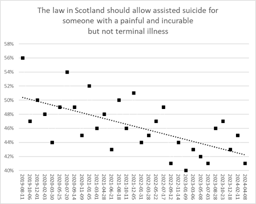Press Statement – Support for Assisted Suicide Ebbs Away in Scotland
Read in PDFThe Journal of Medical Ethics Forum has posted an article by Prof. David Albert Jones, Director of the Anscombe Bioethics Centre, showing that support for assisted suicide in Scotland has declined significantly.
Three polls conducted by the pro-assisted suicide group Dignity in Dying Scotland found that the number of Scots who “strongly supported” legalising assisted dying fell from 55% in 2019, to 45% in 2023, and to 40% in 2024.
A similar pattern was seen in a YouGov bimonthly trackers which asked the same question 31 times over five years: “Do you think the law should or should not be changed to allow someone to assist in the suicide of someone suffering from a painful, incurable but NOT terminal illness?” By April 2024 agreement had decreased to 41%.

People might imagine that Liam McArthur’s Assisted Dying for Terminally Ill Adults (Scotland) Bill would apply only to people with a terminal illness, but in fact the Bill makes no reference to being close to death. It would cover anyone with an advanced progressive condition that would be expected to shorten life if not treated. This would include long term chronic diseases like diabetes. Many people would not think of these as terminal illnesses.
Another opinion poll in March 2024 found that only 47% of Scots wanted their MP to vote to change the law. That figure dropped to 26% among Asian and 16% among Black cohorts. Other surveys demonstrate that when the Scottish public were asked about their top concerns, assisted suicide or assisted dying did not register. It is simply not a priority for voters.
While many say that, on the whole, they tend to support “assisted dying”, much fewer strongly support a change in the law. Analysis of polling data shows that support for Bills like that presented by Liam McArthur is slipping away.
END
Notes to Editors:
- Any part of the above can be quoted as coming from our Director, Professor David Albert Jones.
- If the issues discussed here affect you or someone close to you, you can call Samaritans on 116 123 (UK and ROI), visit their website or contact them on: jo@samaritans.org
- If you are reporting or writing about a case of death by suicide, whether assisted or non-assisted, please consult the Samaritans’ media guidelines on how to do so responsibly.
- For more background information on this issue, see this brief explainer on Euthanasia and Assisted Suicide.
- To read some of the submissions made by the Anscombe Bioethics Centre’s staff to public inquiries and consultations on assisted suicide and euthanasia, see the Reports and Submissions on our website.
- For more information on the Anscombe Bioethics Centre, see our website: www.bioethics.org.uk
- For interviews or comment, contact: media@bioethics.org.uk
Most recent
Press Release – Anscombe Bioethics Centre Launches ‘Advance Decisions and Ethical Choices’ Project
31 July 2025
The Anscombe Bioethics Centre is pleased to launch a new suite of resources on advance statements, l...
Statement on the Anscombe Bioethics Centre
31 July 2025
A statement from the Governing Body of the Anscombe Bioethics Centre and the Trustees of the Catholi...
Copyright Announcement
25 July 2025
Henceforth, all work which had Anscombe Centre or Linacre Centre copyright is now dedicated to the p...
Sincerest Thanks for Your Support
Staff are grateful to all those who sustained the Centre in the past by their prayers and the generous financial support from trusts, organisations, communities and especially from individual donors, including the core funding that came through the Day for Life fund and so from the generosity of many thousands of parishioners. We would finally like to acknowledge the support the Centre has received from the Catholic community in Ireland, especially during the pandemic when second collections were not possible.
We would like to emphasise that, though the Centre is now closed, these donations have not been wasted but have helped educate and support generations of conscientious healthcare professionals, clerics, and lay people over almost 50 years. This support has also helped prevent repeated attempts to legalise euthanasia or assisted suicide in Britain and Ireland from 1993 till the end of the Centre’s work on 31 July 2025.



